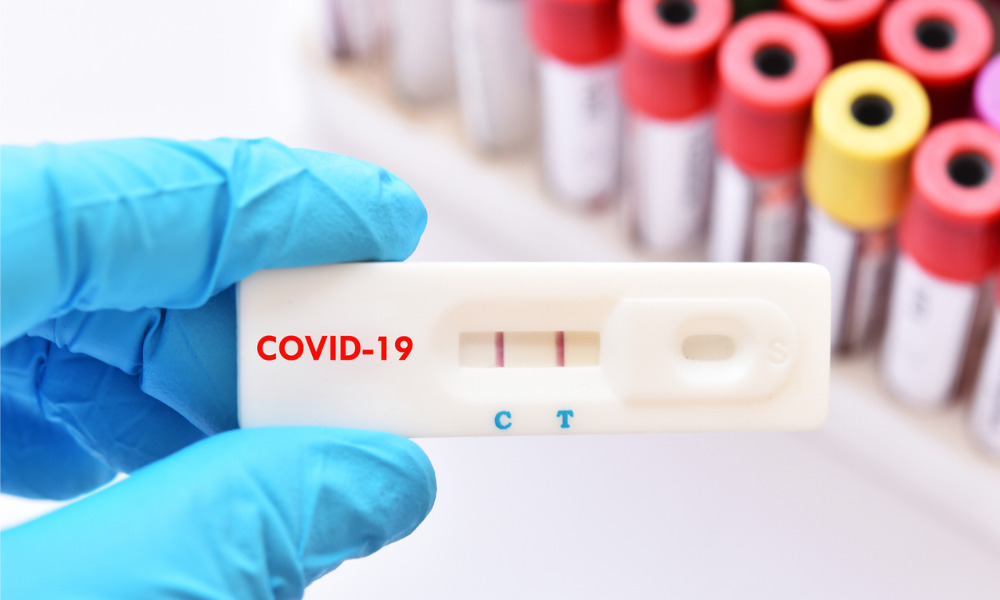‘Employers do have a wide latitude and given the pandemic, I think the courts and tribunals and arbitrators will be lenient’

As many places of business welcome back many employees back to work, what types of testing and screening regimes should be considered by employers to ensure a safe return?
Canadian HR Reporter spoke with Ryan Watkins, partner at Whitten & Lublin employment and labour lawyers in Toronto, about what employers should keep in mind when considering rapid testing.
Q: What are the main benefits of rapid testing?
A: “From an employer standpoint, what’s great about it is that you can get — as the name sounds — rapid testing results rather quickly on whether your employee is potentially infected with COVID-19. Now, it’s not more comprehensive than what we call the PCR [polymerase chain reaction] test, so if somebody does test positive using the rapid test, they would have to then go get a PCR test but, at the end of the day, what it does do is assist in helping against spreading COVID-19 in the workplace.”
Q: How are rapid tests administered?
A: “It has to be done by trained individuals. The company would have to appoint somebody to administer the test, and it’s a swab test that the employee would have to do and then the results would come back fairly quickly. If somebody did test positive, the company would have to inform the local public health unit about that so there is a reporting requirement to it.”
Q: Should employers have a policy for rapid testing?
A: “I always recommend employers — especially with the ever-changing environment with COVID-19 — to always update their policies with respect to COVID-19 so absolutely, employers should be looking to revise their policy on rapid testing if they don’t have anything in place already.
“The main point is that there is a policy in place that everybody is aware of and they agree [to], that they’ve read it and that should be the main criteria to ensure that the program is set up properly and that employees are protected in terms of their privacy. If there are any human rights abuses that are triggered, that there are specific ways to deal with that within the policy.”
Q: What are the pitfalls to rapid testing that employers should be aware of?
A: “Human rights and privacy would probably be the two most important things. You want to make sure, from a privacy perspective, that you are taking care when you’re dealing with personal health information of the workers and what’s being collected, and you want to make sure that it’s being used and disclosed in accordance with all applicable legislation.
The main point is only those that need to know about the information [should know]. For example, if somebody tests positive, you want to ensure it’s not disseminated throughout the workplace. The only people that would really need to know about that is obviously the person doing the testing that would need to report to the public health officials, and then maybe somebody in management or HR. But it should be very limited in terms of who should know about the results.
From a human rights perspective, you may have situations where somebody may not be able to take the test for religious or medical reasons so you want to take precautions there to ensure that employees are being accommodated up to the point of undue hardship.”
Q: How should an employer respond if an employee refuses the test?
A: “The first thing the employer should do is inquire into the reasons and whether it’s a human rights type of scenario. But, in saying that, employers have a wide latitude in terms of initiating this program and there has been a recent arbitration case with a large construction company. EllisDon had employees on certain construction sites that were more susceptible to outbreaks to be tested and the union grieved that policy. The arbitrator ruled that EllisDon is within its right to implement this program.

Ryan Watkins
So, employers do have a wide latitude and given the pandemic, and the ability to try to stop the spread and workplaces, I think the courts and tribunals and arbitrators will be lenient on employers who try to implement a rapid testing policy.”
Q: Will we see more arbitration cases in the future?
A: “I would hope that it doesn’t get litigated too much. We all have to do our part to try to stop the spread of COVID-19 and these policies are there to assist that and so I would hope that there wouldn’t be too strong of a pushback with employers who are implementing these type of programs.”
Canadian HR Reporter also spoke with an expert about the importance of educating employees about rapid testing.
Meanwhile, employers such as Toyota have offered on-site rapid testing for COVID-19 to employees in the Ontario cities of Woodstock and Cambridge.




